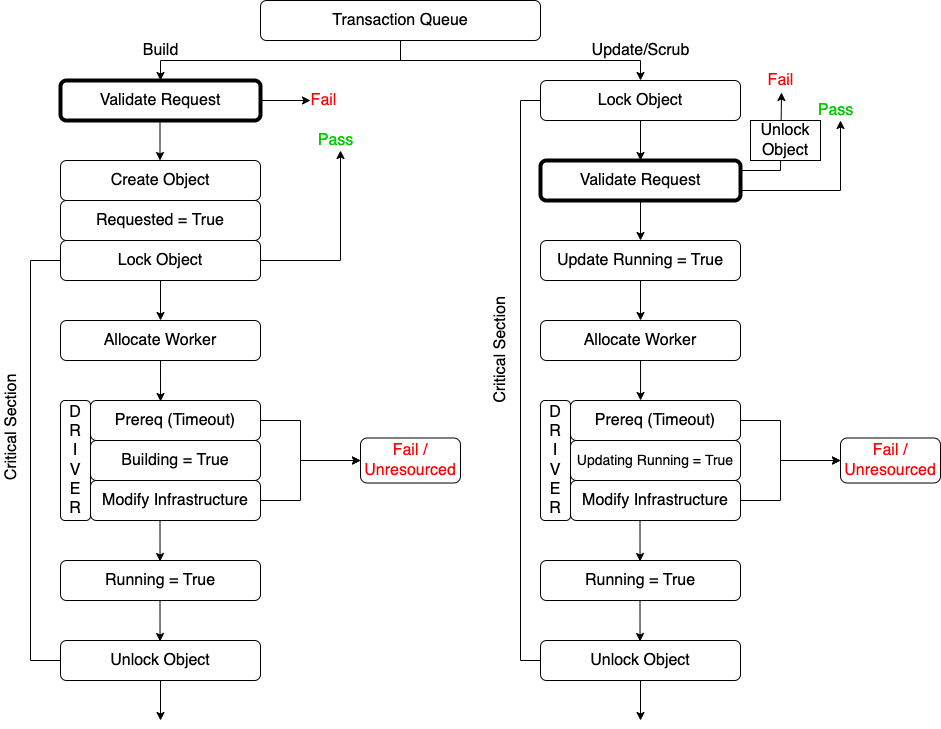Robot Drivers¶
The naming pattern of a Driver is:
<Noun>[_Noun].<Verb>
<Noun> is the Resource Type e.g. “vm”
[_Noun] is the optional hardware e.g. “_kvm”
<Verb> is the Timeout state that needs to be executed for the Resource e.g.
Each Driver functions independently and they do not communicate with each other.
Driver Verb File Structure¶
In a Driver, each verb from the above table for the relevant driver is a python file e.g. The “backup_hyperv” Driver will have build.py and scrub.py
verb.py
DRIVER = 'driver_verb'
LOGGER = 'robot.core.drivers.driver.verb
# Dispatcher: Adds the Task in default Celery Queue of RabbitMQ database
def verb_dispatch(resource_id: int):
# Dispatches a celery task to verb the specified Resource
# log a message about the dispatch, and pass the request to celery
logging.getLogger(f'{LOGGER}.dispatch').debug(f'Passing {RESOURCE} #{resource_id} to the verb task queue.')
verb_driver.delay(resource_id)
# Task: Serves the Task from default Celery Queue in RabbitMQ database
@app.task
def verb_driver(resource_id: int):
# Helper function that wraps the actual task in a span, meaning we don't have to remember to call .finish
logger = logging.getLogger(f'{LOGGER}')
logger.info(f'Worker has picked up the task for verb of {RESOURCE} #{resource_id}')
with TRACER.start_span(LOGGER) as span:
span.set_tag('driver', resource_id)
_verb_driver(resource_id, span)
# Flush the loggers here so it's not in the span
flush_logstash()
def _verb_driver(resource_id: int, span: Span):
# Task to build the specified resource
logger = logging.getLogger(f'{LOGGER}.task')
logger.info(f'Commencing verb of {RESOURCE} #{resource_id}')
# Read the resource from IaaS
# Ensure response status_code is 200
# Add 'errors' key to the repsonse_data of the resource
resource_data['errors'] = []
# Ensure Prerequisites returns True
proceed, msg = _prerequisutes(resource_data, span)
# Update the resource state to In Progress state for the verb and pass the data to the executor
success: bool = False
try:
success = _execute(resource_data, child_span)
except Exception as err:
error = f'{DRIVER}_1000: An unexpected error occurred when attempting to verb {RESOURCE} #{resource_id}'
logger.error(error, exc_info=True)
resource_data['errors'].append(f'{error} Error: {err}')
if success:
logger.info(f'Successfully verb {RESOURCE} #{resource_id}')
# Update the resource state to Stable state for the verb
# Ensure response status_code is 200
# If required, send emails e.g. VM, VPN
else:
# Update state to UNRESOURCED in the API
def _prerequisutes(resource_data, span: Span)
proceed, msg = True, ''
# Ensure that the state of the resource is still currently expected state
# Ensure, if any, all dependecies are met
return proceed, msg
def _execute(resource_data: Dict[str, Any], span: Span) -> bool:
# Execute required primitives to verb driver
return True
Driver Error codes¶
Error Numbering System for Drivers is <driver>_<verb>_xxxx
Code |
Category |
|---|---|
0xxx |
API Interactions Errors |
1xxx |
Internal Interactions Errors |
2xxx |
Primitive Interactions Errors |
Examples:
backup_hyperv_build_0000: API endpoint not available
backup_hyperv_build_0001: Resource not in expected requested state
backup_hyperv_build_1001: Failed to build Backup for resource #10.
backup_hyperv_build_2000: Primitive does not exist
backup_hyperv_build_2001: Primitive returned error message while reporting success
Driver Resource Locking Mechanism¶
Drivers uses CloudCIX’s Jerry Locks mechanism, which is available through CloudCIX’s Python SDK hosted on PyPI.
Jerry Locks implements Peterson’s Mutex (Mutual Exclusive) algorithm
When a Driver locks a Resource’s physical infrastructure, no other Driver can use the same physical infrastructure.
Drivers lock physical infrastructure according to the following flow-diagram:
